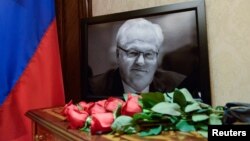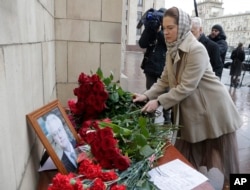New York City's medical examiners have failed to determine what caused the sudden death this week of Russia's ambassador to the United Nations, Vitaly Churkin.
The medical examiners concluded that further study, which usually includes toxicology tests and other screenings, would be needed before they could say why Churkin died unexpectedly Monday at age 64. The additional tests could take weeks to complete.
Churkin had been Russia's envoy at the U.N. since 2006. He was the longest-serving ambassador on the Security Council, the U.N.'s most powerful body.
Diplomatic colleagues from around the world continued to mourn Churkin on Tuesday. They said he was deeply knowledgeable about diplomacy and dedicated to his country, while also being a personable and witty colleague.
'Brilliant, gracious and funny'
"He could spot even the narrowest opportunities to find a compromise,'' U.S. Ambassador Nikki Haley said, describing Churkin as "brilliant, wise, gracious and funny.''
In Washington, President Donald Trump said he was saddened by the news. While acknowledging that Churkin and his U.S. counterparts sometimes disagreed, Trump said Churkin "played a crucial role in working with the United States on a number of key issues to advance global security.''
Vitaly Ivanovich Churkin was born in Moscow on Feb. 21, 1952. As a young boy, he appeared in at least three films; two were about Vladimir Lenin, the hero of the communist revolution that produced the Soviet Union a century ago.
Churkin studied at the Moscow State Institute of International Relations and earned a doctorate in history from the USSR Diplomatic Academy. He joined the Soviet Foreign Ministry in 1974 and had a distinguished career as a diplomat. He was Moscow's special representative to international talks on the former Yugoslavia in the early 1990s, and later served as ambassador to Belgium (1994-1998) and Canada (1998-2003).
Posted to UN in 2006
In 2006, Churkin took up his post as U.N. ambassador, presenting his credentials to then-Secretary General Kofi Annan. During more than a decade at U.N. headquarters in New York, diplomats said the Russian ambassador was widely respected by colleagues, even those whose governments had adversarial relationships with Moscow.
His job grew more difficult during the past six years, as Moscow became more isolated due to its annexation of Crimea from Ukraine, and the Kremlin drew criticism from many quarters for its strong support of the regime of Syrian President Bashar al-Assad.
Churkin often clashed in the Security Council chamber with former U.S. Ambassador Samantha Power. At a heated meeting in December on the situation in the besieged Syrian city of Aleppo, Power called out Moscow for denying and obfuscating facts and aiding and abetting attacks on civilians. Churkin retorted that she sounded like “Mother Teresa” for scolding Moscow, and urged her to “remember your country's track record."
Power tweeted that she was "devastated" by Churkin's passing, calling him a "deeply caring man" and a "diplomatic maestro."
VOA correspondent Margaret Besheer contributed to this report from the United Nations.







